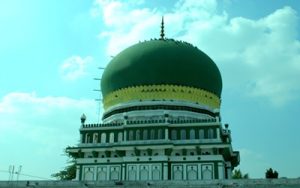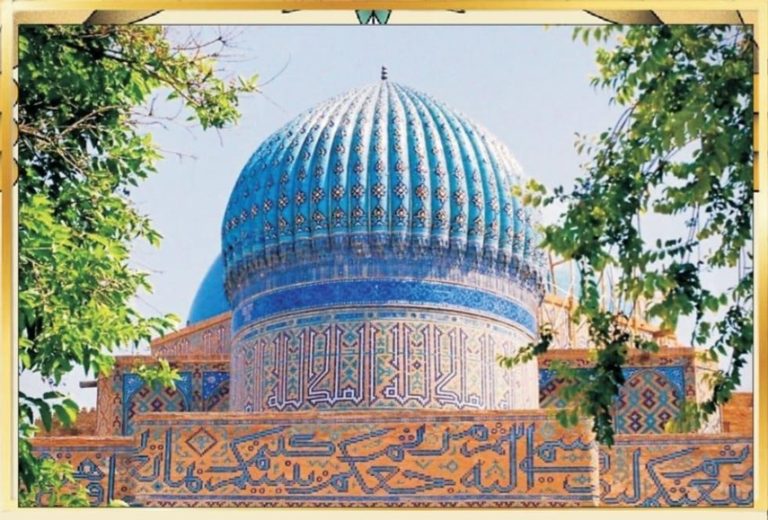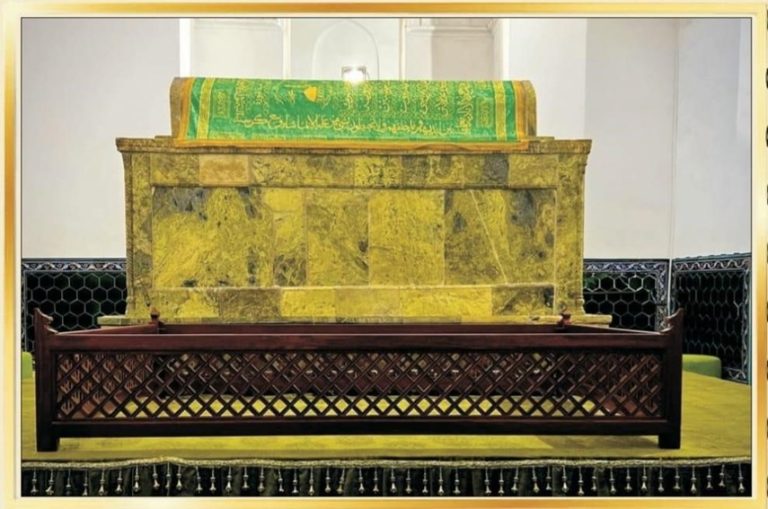Biography of Hazrat Qutbul Hind Hafiz Syedna Mir Shujauddin Hussain Qadri (R.A)

Dome of Bargah-e-Shujaiya, located in Edi Bazar, Hyderabad
INTRODUCTION
Sufism has a history in India evolving for over 1,000 years following the entrance of Islam in the early 8th century. Sufi mystic traditions became more prominent during the 10th and 11th centuries with the rise of the Delhi Sultanate, and over time, Sufism spread beyond Delhi to various regions of India. Sufism was present throughout South Asia and played a leading role in increasing the reach of Islam. By the 12th century, Sufism acquired traits of socially formed movements from where it spread to the South of India along with Islamic invasions. When the ruler of the state initiated a social movement to promote religious education, the one family that supported the movement in its initial stages was that of Hazrath Syed Dayam (died in the year 1776), grandfather of Hazrath Qutbul Hind Hafiz Syedna Mir Shujauddin Hussain Qadri. Hazrat Daim Sahib was not only a great religious scholar but also a dedicated reformer. He campaigned door to door to raise awareness about the benefits of education.
EARLY LIFE AND FAMILY BACKGROUND
Hazrat Qutub-ul-Hind Syedna Mir Shujauddin Hussain was born in the year 1191 Hijri, corresponding to 1774 A.D., in Burhanpur, Madhya Pradesh, India. He hailed from a pious and religious family. His father, Hazrat Syed Kareem Ullah Bahadur, was a renowned religious scholar and the son of Hazrat Syed Daim, who served as the Qazi (Justice) of Burhanpur state.
Hazrat Qutub-ul-Hind belonged to the noble genealogical lineage of Hazrat Muhammad ibn al-Hanafiyyah, the son of Hazrat Syedna Ali ibn Abi Talib (R.A.). His ancestors had migrated from Arabia to India during the reign of the Mughal Emperor Akbar.

Dome of Bargah-e-Hazrath Khaja Ahmed Yasawi RH, Turkistan, Kazakhstan
Hazrat Ahmed Yesevi (R.A.), a Turkish poet and Sufi mystic of the 11th century, greatly influenced the development of mystical orders throughout the Turkish-speaking world. He held the esteemed position of successor (Khalifa) to Hazrat Yusuf Hamdani, who is regarded as the forefather of Hazrat Qutub-ul-Hind. The mausoleum of Hazrat Ahmed Yesevi is located in the city of Turkestan, in southern Kazakhstan.

Bargah-e-Hazrath Khaja Ahmed Yasawi RH, Turkistan, Kazakhstan
Hazrat Qutub-ul-Hind’s mother, Hazrat Arifa Begum Sahiba, was the daughter of Hazrat Khawaja Syed Mohammed Siddiq, also known as Gulam Mohiuddin Sahab. He was a pious individual and the custodian of the historic Jama Masjid of Burhanpur. At the time of Hazrat Qutub-ul-Hind’s parents’ marriage, his father was 60 years old. Unfortunately, Hazrat Qutubul-Hind’s father passed away when he was only 2 years old.
Father of Hazrat Qutb-ul-Hind
Hazrat Qutb-ul-Hind’s father, Hazrat Mir Daim’s beloved son, was Hazrat Allama Syed Karimullah Sahib Quds Sira-ul-Aziz. He was a renowned Sufi and a person of great excellence. His scholarly contributions were so respected that Nawab Nasir Jang Bahadur sought to hand over the Paigah to him. In terms of knowledge and grace, he was among the leading scholars of his era. As part of his daily routine, Hazrat Allama Karimullah Sahib would teach the syllabus book from morning until afternoon. During the noon, he would engage in explaining profound facts and mysteries. Mondays and Fridays were designated as special days for preaching. His matrimonial union occurred when he was about sixty years old. His father-in-law was Hazrat Maulana Syed Khawaja Siddique Sahib alias Ghulam Mohiuddin (may God bless him and grant him peace). His wife, Syeda Arifa Begum Sahib, was an exceptional scholar and Hafiza. She married Hazrat Allama Karimullah Sahib Quds Sira-ul-Aziz in her forties.
Early Life of Hazrat Qutb-ul-Hind
Hazrat Qutb-ul-Hind was born in Burhanpur, Madhya Pradesh, in 1191 AH, corresponding to 1774 A.D. He was the only child of Hazrat Allama Karimullah Sahib Quds Sira-ul-Aziz. Tragically, Hazrat Allama Karimullah Sahib passed away when Hazrat Qutb-ul-Hind was only two years old. After his father’s passing, Hazrat Qutb-ul-Hind was raised and educated by his grandfather, Hazrat Syed Khawaja Siddique Sahib (R.H.), alias Ghulam Mohiuddin, a renowned writer and sage of his time. Hazrat Qutb-ul-Hind Ghouse-e-Deccan learned the fundamentals of Arabic grammar and Hadiths from his grandfather. Prominent scholars and chief ministers often attended the services of Hazrat Ghulam Mohiuddin in Burhanpur. Additionally, Hazrat Ghulam Mohiuddin held the esteemed position of Custodian of the Jama Masjid in Burhanpur, a mosque constructed with black stones, which still stands proudly to this day.
Teachings on Sufism
The core teachings of Sufism are based on the purification of the soul, the seeking of divine love, and the pursuit of inner knowledge. Sufis believe that by engaging in practices such as meditation, prayer, fasting, and reciting the Quran, they can draw closer to God. The Sufi path is often characterized by:
Purification of the Heart: Sufis emphasize the importance of cleansing the heart from negative traits like pride, greed, and envy. This allows the individual to become receptive to divine love and guidance.
Love for God: The primary focus of Sufism is to cultivate a deep love for God, which leads to a greater understanding of the Divine and a desire to serve humanity selflessly.
Direct Experience of God: Sufism teaches that true knowledge of God can only be attained through direct spiritual experience, which goes beyond intellectual understanding.
Inner Knowledge (Ma’rifah): Sufis strive to gain inner knowledge, which is the direct realization of the Divine Truth. This knowledge transcends mere book learning and is attained through deep contemplation and spiritual practice.
The Role of the Guide (Sheikh): In Sufism, the spiritual guide or Sheikh plays a critical role in helping the disciple (Murid) navigate the path towards God. The Sheikh provides guidance, mentorship, and blessings, helping the disciple to purify their soul and develop spiritually.
Knowledge of Qirat (Recitation)
Hazrat Qutb-ul-Hind was also a distinguished scholar in the field of Qirat (the proper recitation of the Quran). His contributions to the study of Quranic recitation were profound. The Deccan region, under his influence, became known for its tradition of Quranic memorization and recitation. Hazrat Qutb-ul-Hind established the first madrasa for Quranic memorization and recitation, which continues to be a source of pride in the region. Many esteemed Hafiz (those who have memorized the Quran) were trained under his guidance, and countless individuals embraced Islam through his teachings. Hazrat Qutb-ul-Hind’s legacy in the realm of Quranic recitation and his dedication to the Quran remains a significant part of his spiritual heritage.
Books Authored
Tafseer-e-Shujaiya: This book is a comprehensive and detailed commentary (Tafseer) on the last chapter (30th Para) of the Holy Quran, as well as other selected Surahs. It delves deeply into the meanings, context, and significance of each verse, providing a rich understanding of the divine messages contained within.
Kashf-ul-Khulasa: A book on Hanifi Fiqh, presented in a poetic form. This work is so highly respected that it is included in the syllabus of many madrasas.
Qhutabaat-e-Shujaiya: A collection of Arabic Qhutbahs (sermons) with Urdu translations, recited before the Friday prayer. This book has been published and is commonly used by Islamic leaders for delivering Friday sermons.
Munajaat Qhatam Al Quran: A supplication to be read upon completing the Quran, with an Urdu translation. A unique feature of this prayer is the inclusion of the names of all 114 Surahs of the Quran, allowing one to seek their intercession when asking Allah for help.
Risala A Simaa: A Persian-language work on spiritual listening (Samaa) as part of Sufi practices.
Risala Jabar O Khadar: A Persian treatise discussing topics related to divine decree and power.
Risala A Ehtalaam: A Persian treatise on the concept of divine dream interpretation. Risala Sulook Qadriya Wa Naqshbandiya: A Persian work exploring the Sufi paths of the Qadriya and Naqshbandiya orders.
Hazrat Qutb-ul-Hind’s Ghazaliat and Poems: A collection of spiritual poetry and prose inspired by the works of Imam Al-Ghazali.
Jawahar Nizam: An Arabic text focusing on spiritual knowledge and practices.
Risala Elm Qiraat: A work in Hindi-Urdu discussing the science of Quranic recitation (Qiraat).
Risalah Ruyat: A Persian text, translated into Urdu, dealing with spiritual visions and experiences.
Risala Fawaid-e-Jamaat: A Persian treatise, translated into Urdu, outlining the benefits of congregational worship.
Arabic Sermons and Poetry: Several Arabic sermons and poems, exploring spiritual themes and Islamic teachings.
Letters and Poems (Qaseedah): A collection of letters and poems, including Qaseedahs (long poems of praise), which are part of his spiritual legacy. Articles Written:
Hazrat Qutb-ul-Hind also wrote numerous articles and essays on Islamic jurisprudence, theology, Sufism, and the Quran. His writings have played an essential role in disseminating knowledge and fostering spiritual awareness among Muslims.
Travel to Hyderabad, Deccan
At the age of forty, when Hazrat Qutb-ul-Hind (R.H.) was blessed with the divine guardianship of Allah and the Prophet (PBUH), he received a divine revelation one midnight while resting in the Jama Masjid of Burhanpur, where he served as an inherited custodian. The revelation instructed him to bring the fruits of Shari’ah and knowledge to the land of Deccan.
At dawn, he gathered his followers and shared the divine command. The people of Burhanpur, deeply attached to him, could not bear his departure, and a significant portion of the town’s population expressed their desire to accompany him. However, Hazrat Qutb-ul-Hind (R.H.) discouraged them, taking only two devoted followers with him and promising to return.

Minar of Jama Masjid Shujaiya
Upon his arrival in Hyderabad, he initially stayed at the Jamia Masjid, Charminar. At the time, the mosque was in a neglected state. Mughal Saheb Subedar Sahib, whose residence was opposite the mosque, used it as a stable for elephants, storing items within its premises and feeding the animals at the pond (houz) inside the mosque. Hazrat Qutb-ul-Hind (R.H.) cleaned a corner of the mosque and began his prayers there.

Mehrab of Jama Masjid Shujaiya
Within days, his piety and spirituality attracted a multitude of visitors, transforming the mosque into a center of spiritual enlightenment. Among those who revered him were prominent nobles of the time, including Nawab Munir-ul-Mulk, Nawab Shams Al-Amra Bahadur, Nawab Izzat Yar Khan Bahadur Sadr Al-Sudoor, Raja Chandu Lal, Nasir-ud-Daula Asif Jah IV, and Afzalud-Daula Asif Jah V. Despite their devotion, Hazrat Qutb-ul-Hind (R.H.) preferred solitude and often avoided their company.
Saheb Hussain Kamandan Embracing Islam
This blessed event in the spiritual legacy of Hazrat Qutb-ul-Hind occurred shortly after the conversion of Ghulam Murtaza Kamandan. Saheb Kamandan, a distinguished general commanding 10,000 regular troops, along with 200 of his men, embraced Islam under the guidance of Hazrat Qutb-ul-Hind. In recognition of his new faith, Hazrat Qutb-ul-Hind bestowed upon him the Islamic name “Sahib Hussain.” This transformative event marked another turning point in the propagation of Islam in the region. The conversion of three highly ranked leaders—Ghulam Rasool, Ghulam Murtaza, and now Sahib Hussain—sparked a wave of inspiration among the masses. These significant figures led countless others to embrace Islam, resulting in a remarkable expansion of the Muslim community. The growing circle of Islam not only strengthened the faith but also weakened the influence of idol worshippers, signaling a decline in disbelief. According to historical accounts, particularly in Tarikh Manaqib Shujaiya, Hazrat Qutb-ulHind is regarded as the pioneer of Islamic propagation and the teachings of the Prophet Muhammad (SAWS) in the Deccan region. His spiritual influence laid the foundation for the first major development of Islam in this part of India, bringing countless people into the fold of faith. This extraordinary legacy of Hazrat Qutb-ul-Hind continues to inspire and resonate with the hearts of believers, reflecting the profound impact of his devotion and guidance.
Death
- Cause of Death:
The exact cause of Hazrat Quds Sira’s death is not clearly documented in the accounts of his life, but his passing marked the end of an era of spiritual leadership. His death was a significant event, not only for his followers but for the wider community. His death was considered a natural transition, deeply respected by those who followed his teachings.
- Place of Burial:
Hazrat Mir Shujauddin Sahib, or Hazrat Quds Sira, was laid to rest in a place of reverence. His burial took place in Khairabad, where he had spent considerable time serving the spiritual and moral needs of his followers. His tomb remains a place of pilgrimage for those who seek blessings and spiritual guidance from his legacy.
Hazrat’s Funeral and Final Resting Place
On the third day after his passing, Hazrat’s funeral procession took place. The funeral prayer was offered three times at the Makkah Mosque by the devotees. The procession moved forward, with Hazrat’s followers walking behind, full of sorrow and reverence. Hazrat was laid to rest in the garden of his grandson, Hazrat Daim Sahib, as he had chosen during his lifetime.

Shrine of Hazrath Qutub-ul-Hind RH at Bargah-e-Shujaiya, Edi Bazar, Hyderabad
His shrine now lies in Shujaiya Bagh at Edibazar, Hyderabad, Deccan, where it continues to be a place of reverence and spiritual significance for his followers.
Construction of the Dome

Bargah-e-Shujaiya, located in Edi Bazar, Hyderabad, was constructed in the year 1845 (1261 H) by Hazrath Syed Mohammed Dayam RH, the grandson of Hazrath Qutub-ul-Hind RH.
After a period of forty days following Hazrat’s passing, his grandson and successor, Hazrat Daim Sahib Qibla, began the preparations for constructing a dome over Hazrat Qutb-ul Hind’s shrine. This was undertaken with Hazrat Daim Sahib’s personal finances. The foundation of the dome was dug to a significant depth, ensuring a strong base for the structure. The height and design of the dome were carefully planned, and the second phase of construction was completed.
Hazrat Syedna Hafiz Abdullah Shah Sahib Qadri (RA)
Hazrat Syedna Hafiz Abdullah Shah Sahib Qadri, known as Qutb Deccan, Shaheed-ul-Islam, Allama-e-Asr, Shaheed Haji, and Hafiz Syed Abdullah Shah Qadri Shaheed Quds Sira-ul-Aziz, was the eldest and only son of Hazrat Qutb-ul-Hind. He was born in the 12th century Hijri in Burhanpur,India.
From a young age, Hazrat Abdullah Shah Sahib demonstrated noble qualities, profound knowledge, and wisdom, reflecting the teachings of his father and forefathers. He was known for his scholarship, truthfulness, and his deep understanding of Islamic teachings. A learned Hafiz and a reciter of the Quran, Hazrat Abdullah Shah Sahib was spiritually and intellectually gifted, following in his father’s footsteps as a Qutb-i-Wilayat (spiritual leader) and Jami-ulKamaal (one who embodies the highest spiritual perfection).

Bargah-e-Shaheedul Islam Syedina Abdullah Shah Quadri (Shaheed) RH, located in Edi Bazar, Hyderabad
Throughout his life, Hazrat Abdullah Shah Sahib embarked on numerous journeys, including traveling on foot for the Hajj pilgrimage, following the example of his father. He became a leader in spreading Islamic teachings, converting thousands of non-Muslims to Islam and guiding countless Muslims in renewing their faith. His work resulted in the formation of a large following of devoted disciples and adherents, many of whom became prominent figures in the Islamic world. Hazrat Abdullah Shah Sahib’s leadership and efforts in Islamic propagation were instrumental in the further spread of Islam and its sciences.
Sadly, Hazrat Abdullah Shah Sahib met martyrdom during a holy journey in Udgir, Maharashtra. He was martyred on the 24th of Muharram al-Haram in 1250 AH.
LIST OF SAJJADAGAN OF BARGAH SHUJAIYA QUTB-ULHIND
- Hazrat Maulana Syed Shah Daim Sahib Qadri (R.H).
- Hazrat Maulana Syed Shah Abdullah Shah Qadri Sani (R.H).
- Hazrat Maulana Syed Shah Yasin Shah Sahib Qadri (R.H).
- Hazrat Maulana Syed Shah Ghulam Samdani Sahib Qadri (R.H).
- Hazrat Maulana Syed Shah Shujauddin Sahib Qadri Sani (R.H).
- Hazrat Maulana Syed Shah Ubaidullah Sahib Qadri (Asif Pasha) – Hafizullah.